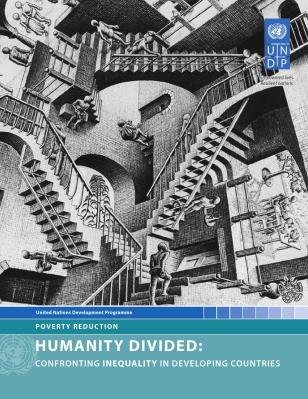Humanity Divided: Confronting Inequality in Developing Countries

Humanity Divided: Confronting Inequality in Developing Countries
March 3, 2014
This report revisits the theoretical concepts of inequalities including their measurements, analyzes their global trends, presents the policy makers’ perception of inequalities in 15 countries and identifies various policy options in combating this major development challenge of our time.
The report makes the basic point that in spite of the impressive progress humanity has made on many fronts over the decades, it still remains deeply divided. In that context, it is intended to help development actors, citizens, and policy makers contribute to global dialogues and initiate conversations in their own countries about the drivers and extent of inequalities, their impact, and the ways in which they can be curbed.
This report was prepared by the Poverty Practice in the Bureau for Development Policy, UNDP.
Highlights
- On average—and taking into account population size—income inequality increased by 11 percent in developing countries between 1990 and 2010.
- A significant majority of households in developing countries—more than 75 percent of the population—are living today in societies where income is more unequally distributed than it was in the 1990s.
- Evidence shows that, beyond a certain threshold, inequality harms growth and poverty reduction, the quality of relations in the public and political spheres of life and individuals’ sense of fulfilment and self-worth.

 Locations
Locations